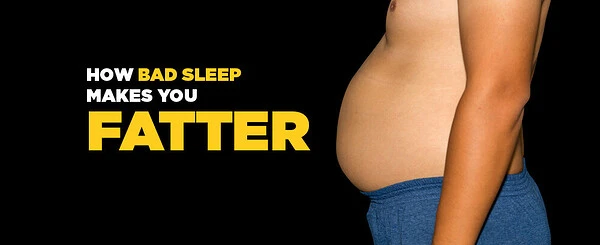The Impact of Sleep Deprivation on Hunger, Fat Burning, and the Solution
Abstract: This article delves into the phenomenon of how losing sleep can lead to increased hunger and slower fat - burning in the body. It also provides insights into the underlying mechanisms and offers a practical solution to address this issue.
Introduction
Losing sleep not only makes an individual hungrier but also slows down the body's fat - burning process. Understanding the reasons behind this and finding a way to rectify it is crucial for maintaining health and achieving physique goals.
Most individuals require approximately 8 hours of sleep to function at their optimal level and stay healthy. However, genetic variations play a significant role in determining an individual's sleep - need duration. For instance, certain people possess genetic variants that result in a shorter circadian cycle, enabling them to function effectively with less sleep, around 7 hours. Conversely, others have variants that demand a longer sleep duration, about 9 hours, to be in sync with their biological rhythm. A small percentage of the population, ranging from 1 - 3%, can manage with 6 hours of sleep due to a unique gene mutation.
The concern lies in the fact that many individuals wrongly assume they are among those with the "mutation" allowing for less sleep, while in reality, their health and fitness aspirations are being compromised. One can identify sleep - deprivation through the following tell - tale signs:
Constant hunger, with a strong inclination towards energy - dense snacks, typically high in carbohydrates and/or fat.
Abnormally slow fat loss during dieting.
Difficulty in getting motivated to engage in training.
Unexplained increase in body fat without any dietary changes.
All these are manifestations of sleep deprivation. A recent narrative review published in Nutrients explored the mechanisms behind this. This article will summarize these findings and then discuss the most straightforward solution for improving sleep.
Why Sleep Loss Leads to Weight Gain
Based on the study, when most people get 6 hours or less of sleep, the following physiological changes occur:
Hormonal Imbalances
Insufficient sleep disrupts the hormones that regulate appetite. It leads to a 20 - 30% increase in ghrelin, known as the hunger hormone, while simultaneously causing a 15 - 20% decrease in leptin, the satiety or fullness hormone. As a consequence, a sleep - deprived individual typically consumes 200 to 500 additional calories the next day.
Metabolic Changes
Sleep loss reduces insulin sensitivity by 20 - 30%, impairs glucose metabolism, and promotes fat storage. During a diet, sleep deprivation can decrease fat loss by up to 55%.
Behavioral Effects
The fatigue resulting from sleep loss dampens training motivation and encourages the selection of unhealthy food options.
Weight Loss Maintenance
Chronic sleep deprivation undermines long - term weight maintenance. By perpetuating hormonal and metabolic disruptions, it increases the likelihood of fat regain. Elevated cortisol levels further contribute to fat accumulation, particularly in the abdominal area.
Mechanisms
Sleep deprivation impacts the brain's reward system, heightening cravings for palatable foods. Additionally, it disrupts circadian rhythms, which in turn further affects metabolism.
The Easiest Solution
A significant majority of individuals with sleep problems suffer from a magnesium deficiency. In fact, up to 80% of the US population lacks this essential mineral.
Magnesium plays a pivotal role in promoting sleep. It regulates neurotransmitters and hormones involved in the sleep - wake cycle. Acting as a natural relaxant, magnesium binds to GABA receptors in the brain, enhancing GABA activity. This, in turn, calms neural activity and fosters relaxation.
Furthermore, magnesium aids in regulating melatonin production, the hormone that signals the onset of sleep, by supporting the function of the pineal gland. It also reduces cortisol levels, alleviating the stress that can disrupt sleep. By relaxing muscles and reducing inflammation, magnesium creates an environment conducive to restful sleep, improving both sleep onset and quality.
Some may argue, "But I consume magnesium - rich foods and take magnesium supplements!" However, modern farming practices have led to a reduction in the magnesium content of food. And while supplementation is beneficial, it depends on the body's ability to absorb it. For optimal results, Albion - chelated magnesium, specifically 400 mg of glycinate chelate, is recommended.
Elitepro Vital Minerals (available for purchase on Amazon) contains 400 mg of magnesium along with other minerals that are difficult to obtain solely from food. It is advisable to take four tablets every night.
Regarding the time it takes to correct a magnesium deficiency, most people start to notice a difference after one or two weeks of consistent supplementation. Severe deficiencies may take longer, but a chelated formula can expedite the process.
Reference
Papatriantafyllou, et al. Sleep Deprivation: Effects on Weight Loss and Weight Loss Maintenance. Nutrients 2022 Apr 8;14(8):1549. doi: 10.3390/nu14081549.
The 6-Hour Problem
•
Author: Flint
•
fitness
sport
life

Share this article
